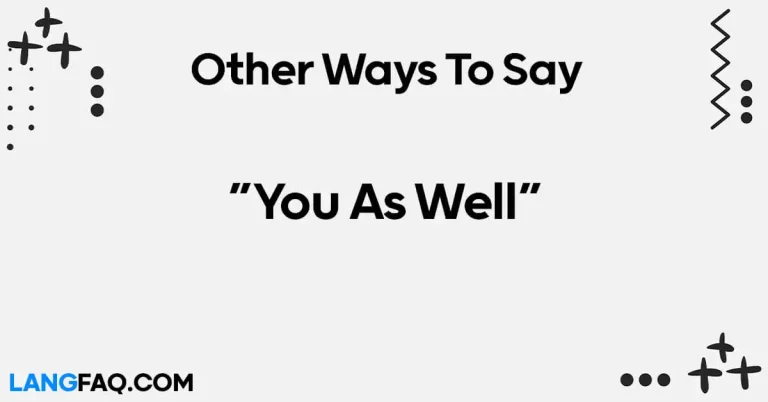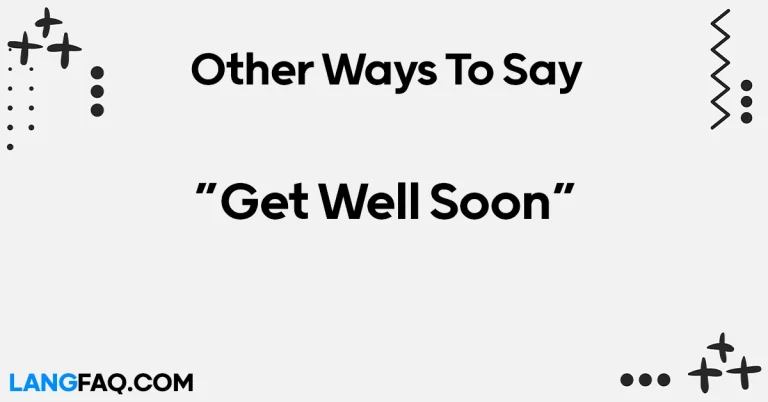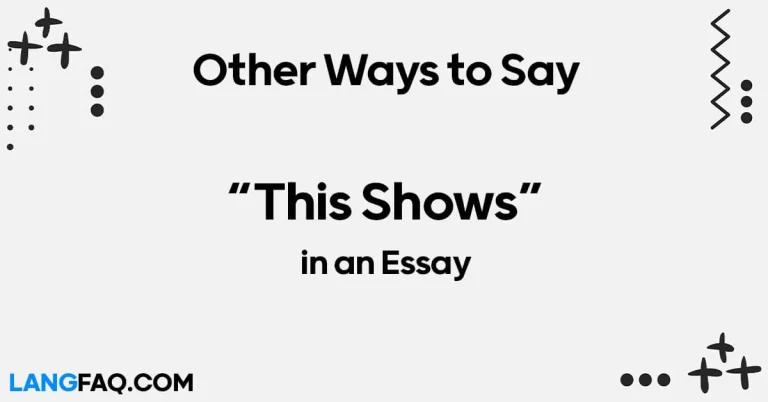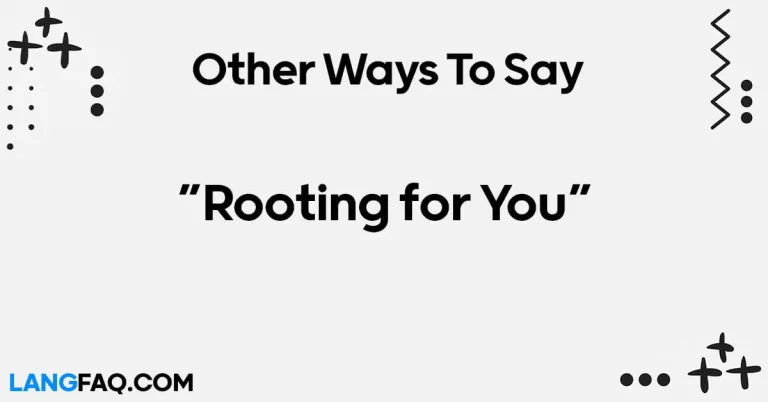In various situations, saying “I will look into it” might seem repetitive or lackluster. Whether you’re in a professional setting or having a casual conversation, diversifying your vocabulary can make your communication more engaging and effective. This article presents 12 alternative phrases to express your intention to investigate or address a matter, offering fresh ways to convey your commitment and responsiveness.
12 Other Ways to Say “I Will Look Into It”
Here are 12 other ways to say “I will look into it”:
- I’ll investigate further.
- Let me delve deeper into that.
- I’ll explore the matter thoroughly.
- Consider it under thorough examination.
- I’ll take a closer look at it.
- Let me examine it closely.
- I’ll give it my full attention.
- I’ll get to the bottom of it.
- I’ll look into the details.
- I’ll conduct a thorough analysis.
- I’ll scrutinize the issue.
- I’ll address this promptly.
| Expression | Meaning | Example |
|---|---|---|
| Investigate further | To examine or inquire into something | “I’ll investigate further and get back to you.” |
| Delve deeper into that | To explore or investigate thoroughly | “Let me delve deeper into that and find out.” |
| Explore the matter thoroughly | To thoroughly examine or investigate | “I’ll explore the matter thoroughly and provide feedback.” |
| Under thorough examination | Subjected to detailed scrutiny | “Consider it under thorough examination before making a decision.” |
| Take a closer look at it | To examine closely or scrutinize | “I’ll take a closer look at it to understand better.” |
| Examine it closely | To scrutinize or inspect closely | “Let me examine it closely before we proceed.” |
| Give it my full attention | To dedicate complete focus and effort | “I’ll give it my full attention and resolve the issue.” |
| Get to the bottom of it | To uncover the underlying truth or cause | “I’ll get to the bottom of it and provide an explanation.” |
| Look into the details | To examine or analyze the specifics | “I’ll look into the details and provide a comprehensive report.” |
| Conduct a thorough analysis | To perform a comprehensive study or evaluation | “I’ll conduct a thorough analysis before making any decisions.” |
| Scrutinize the issue | To examine or inspect closely | “I’ll scrutinize the issue to identify any discrepancies.” |
| Address this promptly | To deal with or attend to promptly | “I’ll address this promptly and provide a solution.” |
These alternative expressions offer various ways to convey the intent of investigating or addressing a matter. Whether it’s examining closely, conducting thorough analysis, or giving full attention, diversifying your vocabulary enhances communication effectiveness and ensures a proactive approach to problem-solving.
Is It Correct to Say “I Will Look Into It”?
Yes, “I will look into it” is a correct and commonly used phrase in English. It conveys the intention to investigate or examine a matter further to gain understanding or find a solution. This phrase is often used in both formal and informal contexts, such as in business settings, academic environments, or everyday conversations.
Example Sentence:
- Formal: “Thank you for bringing this issue to my attention. I will look into it and provide you with an update.”
- Informal: “I’m not sure how to fix this problem, but I will look into it and see what I can do.”
Email Sample: Subject: Investigation of the Matter
Dear [Recipient’s Name],
I acknowledge your concerns regarding the recent discrepancies. Rest assured, I will look into it promptly and provide you with a resolution.
Best regards, [Your Name]
Variations:
- Colleagues: “I’ll investigate further.”
- Friends: “Let me check it out.”
- Mentor-Mentee: “I’ll explore this and get back to you.”
Professional Mail Example With “I Will Look Into It”
Subject: Follow-Up on Recent Inquiry
Dear [Recipient’s Name],
I hope this email finds you well. Thank you for reaching out with your questions regarding [specific topic or issue]. I appreciate your attention to detail and your commitment to ensuring clarity in our discussions.
Rest assured, I have received your inquiry, and I will look into it promptly. I will carefully review the information provided and conduct a thorough analysis to address your concerns effectively. My goal is to provide you with a comprehensive response that addresses all aspects of your inquiry and offers clear guidance moving forward.
I understand the importance of resolving this matter promptly, and I assure you that I will prioritize it accordingly. Please feel free to reach out if you have any additional questions or concerns in the meantime.
Thank you for your patience and understanding.
Best regards, [Your Name]
Investigate Further
When you encounter a situation that requires a deeper understanding or thorough examination, expressing your commitment to investigate further can reassure others of your dedication. This phrase implies a willingness to delve into the matter and gather additional information or insights to reach a resolution.
Formal Context: In a professional setting, using “investigate further” demonstrates your proactive approach to problem-solving and your commitment to ensuring accuracy and thoroughness in your work.
Informal Context: With friends or family, this phrase can be casually used to indicate your intention to look into a matter more closely, such as when planning a trip or organizing an event.
Example Sentence:
- Formal: “Thank you for bringing this to my attention. I will investigate further and provide you with a detailed analysis by the end of the week.”
- Informal: “I noticed some discrepancies in our plans. Let me investigate further and see if we can find a solution.”
Email Sample:
Subject: Follow-Up on the Marketing Campaign Analysis
Dear Team,
Following our discussion in today’s meeting, I wanted to assure you that I will investigate further into the performance metrics of our recent marketing campaign. I will analyze the data more comprehensively and provide a detailed report by Friday.
Best regards, [Your Name]
Variations:
- Colleagues: “I will conduct further research.”
- Friends: “I’ll dig deeper into this and let you know.”
- Mentor-Mentee: “Let’s explore this topic further in our next meeting.”
Delve Deeper into That
To “delve deeper into that” is to express a commitment to exploring a topic or issue in greater detail. This phrase suggests a thorough investigation or examination to gain deeper insights or understanding.
Formal Context: In professional discussions or presentations, using “delve deeper into that” can signal your intention to analyze a specific aspect of a topic with more depth and detail.
Informal Context: When conversing with friends or family about a complex issue, this phrase can convey your willingness to explore the matter further and engage in a meaningful discussion.
Example Sentence:
- Formal: “During the next phase of our project, we will delve deeper into that particular aspect to identify any potential challenges or opportunities.”
- Informal: “I find the historical context fascinating. Let’s delve deeper into that over dinner tonight.”
Email Sample:
Subject: Further Exploration of Market Trends
Hi [Recipient’s Name],
I hope this email finds you well. I wanted to follow up on our previous discussion regarding the latest market trends. I believe it’s crucial for us to delve deeper into that topic to better understand the dynamics and implications for our business strategy.
Looking forward to exploring this further with you.
Best regards, [Your Name]
Variations:
- Colleagues: “Let’s examine this aspect more closely.”
- Friends: “I’m curious to learn more about that. Shall we explore further?”
- Mentor-Mentee: “As part of your development, I encourage you to delve deeper into this subject matter.”
Explore the Matter Thoroughly
When you commit to “exploring the matter thoroughly,” you’re indicating your intent to conduct a comprehensive examination or investigation to gain a thorough understanding of the topic or issue at hand.
Formal Context: Using this phrase in professional contexts, such as meetings or reports, demonstrates your dedication to ensuring accuracy and completeness in your analysis.
Informal Context: In casual conversations, expressing a desire to “explore the matter thoroughly” can show your genuine interest in understanding a topic or resolving a problem.
Example Sentence:
- Formal: “Before making any decisions, it’s essential for us to explore the matter thoroughly and consider all relevant factors.”
- Informal: “I’m not sure about the best approach here. Let’s explore the matter thoroughly together and come up with a solution.”
Email Sample:
Subject: Request for Comprehensive Analysis
Dear [Recipient’s Name],
I trust this email finds you well. I wanted to discuss the recent project developments and emphasize the importance of exploring the matter thoroughly. I believe a comprehensive analysis is necessary to address any potential challenges and optimize our strategy moving forward.
Looking forward to your insights on this.
Best regards, [Your Name]
Variations:
- Colleagues: “We need to thoroughly examine this issue.”
- Friends: “Let’s dive deep into this and explore all angles.”
- Mentor-Mentee: “As part of your learning process, I encourage you to explore this matter thoroughly and document your findings.”
Under Thorough Examination
When something is “under thorough examination,” it signifies that it is being subjected to detailed scrutiny or analysis to ensure accuracy and completeness.
Formal Context: Using this phrase in professional contexts, such as reports or presentations, indicates that a matter is being carefully assessed and evaluated.
Informal Context: In everyday conversations, mentioning that something is “under thorough examination” can convey a sense of diligence and seriousness in addressing a particular issue or concern.
Example Sentence:
- Formal: “The recent financial statements are currently under thorough examination to identify any discrepancies or irregularities.”
- Informal: “I received your feedback on the proposal. Rest assured, it’s under thorough examination, and I’ll get back to you with updates soon.”
Email Sample:
Subject: Update on Project Assessment
Hello [Recipient’s Name],
I hope you’re doing well. I wanted to provide you with an update on the project assessment. As discussed, the data is currently under thorough examination to ensure accuracy and reliability. I appreciate your patience and will keep you informed of any significant findings.
Best regards, [Your Name]
Variations:
- Colleagues: “The matter is currently under careful review.”
- Friends: “I’m looking into it closely to make sure everything’s in order.”
- Mentor-Mentee: “I’m guiding you through the process, and your work is under thorough examination to help you learn and improve.”
Take a Closer Look at It
To “take a closer look at it” implies a focused examination or scrutiny of a specific aspect or detail to gain a better understanding or identify any issues or opportunities.
Formal Context: In business discussions or project reviews, using this phrase can indicate a need for detailed analysis or assessment to ensure quality and accuracy.
Informal Context: In everyday conversations, suggesting to “take a closer look at it” can signal a desire to examine something more closely or investigate further.
Example Sentence:
- Formal: “Before finalizing the budget, we need to take a closer look at it to identify any areas for optimization or cost-saving opportunities.”
- Informal: “I noticed a discrepancy in the data. Let’s take a closer look at it together and see if we can find the issue.”
Email Sample:
Subject: Request for Detailed Analysis
Hi [Recipient’s Name],
I hope you’re doing well. Regarding the recent project update, I’d like to request that we take a closer look at it to ensure all requirements are met and any potential risks are addressed. Your attention to detail in this matter would be greatly appreciated.
Looking forward to your insights.
Best regards, [Your Name]
Variations:
- Colleagues: “We should examine this aspect more closely.”
- Friends: “Let’s take a closer look at it and see what we find.”
- Mentor-Mentee: “As part of your learning process, I encourage you to take a closer look at it and analyze the details carefully.”
Dive into the Details
When you “dive into the details,” you’re expressing a commitment to examining the specific aspects or intricacies of a topic or issue to gain a comprehensive understanding.
Formal Context: Using this phrase in business discussions or project management emphasizes the importance of thorough analysis and attention to detail in achieving successful outcomes.
Informal Context: In casual conversations, suggesting to “dive into the details” can signal a desire to explore a topic more deeply or understand it more fully.
Example Sentence:
- Formal: “Before finalizing the contract, we need to dive into the details to ensure all terms and conditions are clearly defined and understood.”
- Informal: “I’m curious about the logistics of the event. Let’s dive into the details and make sure everything’s planned out.”
Email Sample:
Subject: Request for Detailed Information
Hi [Recipient’s Name],
I trust this email finds you well. Regarding the upcoming project, I’d like to dive into the details to ensure we have a thorough understanding of all requirements and considerations. Your assistance in gathering the necessary information would be invaluable.
Looking forward to your input on this.
Best regards, [Your Name]
Variations:
- Colleagues: “Let’s dig deeper into the specifics.”
- Friends: “I want to know more about this. Shall we dive into the details together?”
- Mentor-Mentee: “As part of your development, I encourage you to dive into the details and analyze the specific aspects of the project.”
Get to the Bottom of It
To “get to the bottom of it” means to uncover the underlying truth or cause of a situation or issue by conducting a thorough investigation or examination.
Formal Context: Using this phrase in professional contexts, such as problem-solving discussions or investigations, emphasizes the importance of identifying root causes and addressing them effectively.
Informal Context: In casual conversations, suggesting to “get to the bottom of it” can signal a determination to resolve a mystery or clarify a misunderstanding.
Example Sentence:
- Formal: “In order to address the recurring issue, we need to get to the bottom of it and identify the root cause.”
- Informal: “There seems to be some confusion. Let’s get to the bottom of it and figure out what’s going on.”
Email Sample:
Subject: Clarification Needed
Hello [Recipient’s Name],
I hope you’re well. I wanted to discuss the recent discrepancies in the data. It’s crucial for us to get to the bottom of it and determine the cause to prevent similar issues in the future.
Looking forward to your insights on this matter.
Best regards, [Your Name]
Variations:
- Colleagues: “We need to uncover the truth behind this issue.”
- Friends: “Let’s figure out what’s really going on here and get to the bottom of it.”
- Mentor-Mentee: “I encourage you to dig deeper and get to the bottom of it to gain a better understanding of the situation.”
Look into the Details
When you “look into the details,” you’re indicating your intention to examine or investigate the specific aspects or components of a situation or issue.
Formal Context: Using this phrase in business discussions or project management highlights the importance of paying attention to the finer points or specifics to ensure accuracy and thoroughness.
Informal Context: In everyday conversations, suggesting to “look into the details” can convey a desire to understand a topic more deeply or address a specific aspect more thoroughly.
Example Sentence:
- Formal: “Before finalizing the proposal, we need to look into the details to ensure all requirements are met and all potential risks are addressed.”
- Informal: “I’m not sure about the logistics. Let’s look into the details and make sure everything’s in order.”
Email Sample:
Subject: Review of Project Specifications
Hi [Recipient’s Name],
I hope you’re doing well. I wanted to touch base regarding the project specifications. It’s essential for us to look into the details to ensure we’re aligned with the client’s requirements and expectations.
Looking forward to your input on this.
Best regards, [Your Name]
Variations:
- Colleagues: “Let’s examine this aspect more closely.”
- Friends: “I’m curious about this. Shall we look into the details together?”
- Mentor-Mentee: “As part of your learning process, I encourage you to look into the details and analyze the specifics of the project.”
Conduct a Thorough Analysis
To “conduct a thorough analysis” is to perform a comprehensive study or evaluation of a subject or situation to gain insights or make informed decisions.
Formal Context: Using this phrase in professional contexts, such as business reports or research projects, emphasizes the importance of systematic examination and careful consideration of all relevant factors.
Informal Context: In casual conversations, suggesting to “conduct a thorough analysis” can signal a commitment to understanding a topic more deeply or resolving a complex issue.
Example Sentence:
- Formal: “Before making any strategic decisions, it’s essential for us to conduct a thorough analysis of the market trends and consumer behavior.”
- Informal: “I’m not sure about the best approach here. Let’s conduct a thorough analysis and see what we find.”
Email Sample:
Subject: Request for In-Depth Analysis
Hello [Recipient’s Name],
I trust this email finds you well. Regarding the recent project updates, I’d like to request that we conduct a thorough analysis to ensure we have a comprehensive understanding of all relevant factors.
Your expertise in this matter would be greatly appreciated.
Best regards, [Your Name]
Variations:
- Colleagues: “We need to analyze this situation in detail.”
- Friends: “Let’s dig deeper into this and conduct a thorough analysis.”
- Mentor-Mentee: “As part of your development, I encourage you to conduct a thorough analysis and document your findings.”
Scrutinize the Issue
To “scrutinize the issue” means to examine or inspect it closely and critically to identify any problems, inconsistencies, or areas for improvement.
Formal Context: Using this phrase in professional contexts, such as project reviews or quality assessments, underscores the importance of thorough examination and attention to detail.
Informal Context: In everyday conversations, suggesting to “scrutinize the issue” can convey a desire to understand a problem more deeply or address it more effectively.
Example Sentence:
- Formal: “As part of the quality assurance process, we need to scrutinize the issue to ensure all standards and requirements are met.”
- Informal: “There seems to be a misunderstanding. Let’s scrutinize the issue together and figure out where things went wrong.”
Email Sample:
Subject: Review of Project Concerns
Hi [Recipient’s Name],
I hope you’re doing well. I wanted to discuss the recent project concerns and suggest that we scrutinize the issue to identify any underlying causes or potential solutions.
Your input on this matter would be invaluable.
Best regards, [Your Name]
Variations:
- Colleagues: “Let’s closely examine this problem.”
- Friends: “I’m not sure about this. Shall we scrutinize the issue together?”
- Mentor-Mentee: “As part of your learning process, I encourage you to scrutinize the issue and analyze it from different perspectives.”
Address This Promptly
To “address this promptly” means to deal with or attend to it quickly and efficiently, without delay.
Formal Context: Using this phrase in professional contexts, such as customer service interactions or project management, emphasizes the importance of timely response and resolution.
Informal Context: In everyday conversations, suggesting to “address this promptly” can convey a sense of urgency or importance in resolving a matter.
Example Sentence:
- Formal: “Thank you for bringing this to our attention. Rest assured, we will address this promptly and provide you with a resolution.”
- Informal: “We need to sort this out quickly. Let’s address this promptly and move on.”
Email Sample:
Subject: Urgent Matter Requiring Attention
Hello [Recipient’s Name],
I hope you’re well. I wanted to highlight an urgent matter that requires our attention. It’s crucial that we address this promptly to prevent any further complications.
Looking forward to your swift action on this.
Best regards, [Your Name]
Variations:
- Colleagues: “Let’s deal with this promptly.”
- Friends: “We need to handle this quickly. Shall we address this promptly?”
- Mentor-Mentee: “As part of your development, I encourage you to address this promptly and demonstrate your ability to handle urgent situations.”
Provide a Comprehensive Response
To “provide a comprehensive response” is to offer a thorough and detailed reply or solution that addresses all aspects of a question or issue.
Formal Context: Using this phrase in professional contexts, such as customer inquiries or project updates, underscores the importance of clarity, completeness, and accuracy in communication.
Informal Context: In everyday conversations, suggesting to “provide a comprehensive response” can convey a commitment to providing a thorough and helpful answer.
Example Sentence:
- Formal: “Thank you for your inquiry. We will provide a comprehensive response that addresses all your questions and concerns.”
- Informal: “I’m not sure about all the details, but I’ll provide a comprehensive response as soon as I can.”
Email Sample:
Subject: Response to Client Inquiry
Dear [Recipient’s Name],
I trust you’re doing well. Thank you for reaching out with your questions. Rest assured, we will provide a comprehensive response that addresses all your inquiries in detail.
Looking forward to assisting you further.
Best regards, [Your Name]
Variations:
- Colleagues: “Let’s ensure we give a comprehensive response.”
- Friends: “I’ll cover everything in my response. Expect a comprehensive reply.”
- Mentor-Mentee: “As part of your development, I encourage you to provide a comprehensive response that addresses all aspects of the question.”
Give It My Full Attention
To “give it my full attention” means to dedicate complete focus and effort to a task or issue, without distraction or interruption.
Formal Context: Using this phrase in professional contexts, such as meetings or project discussions, emphasizes the importance of active listening and engagement.
Informal Context: In everyday conversations, suggesting to “give it my full attention” can convey a commitment to being fully present and attentive in a conversation or activity.
Example Sentence:
- Formal: “During our meeting, I will give the presentation my full attention and take detailed notes for further discussion.”
- Informal: “I’m listening, and I’ll give it my full attention. Please continue.”
Email Sample:
Subject: Commitment to Focus
Hi [Recipient’s Name],
I hope this email finds you well. I wanted to confirm our upcoming meeting and assure you that I will give it my full attention. I look forward to our discussion.
Best regards, [Your Name]
Variations:
- Colleagues: “I’ll focus on this completely.”
- Friends: “I’m all ears. I’ll give it my full attention.”
- Mentor-Mentee: “During our session, I encourage you to give it your full attention and actively participate in the discussion.”
Commit to Investigating
To “commit to investigating” is to pledge or promise to explore a matter thoroughly in order to gain insights or resolve issues effectively.
Formal Context: Using this phrase in professional contexts, such as research projects or problem-solving initiatives, emphasizes the importance of dedication and persistence in seeking solutions.
Informal Context: In everyday conversations, suggesting to “commit to investigating” can convey a determination to understand a situation better or address a concern proactively.
Example Sentence:
- Formal: “As part of our quality assurance process, we commit to investigating any reported issues promptly and thoroughly.”
- Informal: “I’m not sure about this, but I’m committed to investigating and finding out.”
Email Sample:
Subject: Assurance of Investigation
Hello [Recipient’s Name],
I trust you’re well. I wanted to address the recent concerns raised regarding our operations. Please be assured that we are committed to investigating these matters thoroughly and implementing any necessary improvements.
Thank you for your attention to this.
Best regards, [Your Name]
Variations:
- Colleagues: “We’re dedicated to investigating this thoroughly.”
- Friends: “I’ll look into this and get back to you. I’m committed to investigating.”
- Mentor-Mentee: “I encourage you to commit to investigating this matter thoroughly to gain a better understanding.”
Promise to Follow Through
To “promise to follow through” is to assure others that you will take the necessary steps to address a matter or fulfill a commitment, without fail.
Formal Context: Using this phrase in professional contexts, such as project management or customer service interactions, emphasizes reliability and accountability in delivering results.
Informal Context: In everyday conversations, suggesting to “promise to follow through” can convey a sense of trustworthiness and dependability in keeping one’s word.
Example Sentence:
- Formal: “Thank you for bringing this to my attention. I promise to follow through and provide you with updates on our progress.”
- Informal: “Don’t worry, I’ll take care of it. I promise to follow through and get it done.”
Email Sample:
Subject: Commitment to Action
Hi [Recipient’s Name],
I hope you’re doing well. I wanted to address the recent feedback we received and assure you that I am committed to taking action. I promise to follow through and provide you with updates on our progress.
Thank you for your patience and understanding.
Best regards, [Your Name]
Variations:
- Colleagues: “Rest assured, I’ll follow through on this.”
- Friends: “You can count on me to follow through. I’ll keep you posted.”
- Mentor-Mentee: “As part of your development, I encourage you to promise to follow through on your commitments and demonstrate reliability.”
FAQs:
What are some alternative phrases for “I will look into it”?
- Delve deeper into the matter, conduct a thorough examination, explore the issue further, take a closer look, dive into the details, get to the bottom of it, follow up on the matter, address the concern, provide a comprehensive response, give it my full attention, commit to investigating, promise to follow through.
How can these alternative expressions enhance communication?
- By diversifying your vocabulary, you can make your communication more engaging, effective, and nuanced. These phrases convey a sense of commitment, attentiveness, and proactive problem-solving, strengthening your interactions with others.
When should I use these alternative phrases?
- You can use these alternative expressions in various contexts, including professional settings, personal conversations, and written communication. Choose the phrase that best fits the tone and context of your message to convey your commitment and responsiveness effectively.
Are there any other benefits to using alternative expressions?
- Yes, using diverse language can help prevent communication fatigue and maintain the interest of your audience. It also demonstrates your adaptability and creativity in expressing ideas and addressing issues.
How can I remember to use these alternative phrases in conversation?
- Practice incorporating these expressions into your everyday communication gradually. You can also create flashcards or mnemonic devices to help reinforce your memory and recall the phrases when needed.
Where can I find more resources on improving communication skills?
- You can explore books, articles, online courses, and workshops focused on communication skills development. Additionally, seeking feedback from peers or mentors can help you identify areas for improvement and refine your communication style.
Conclusion:
Incorporating alternative expressions into your vocabulary can enrich your communication skills and enhance your ability to convey commitment, attentiveness, and proactive problem-solving. By exploring diverse ways to express your intention to investigate or address a matter, you can engage with others more effectively and strengthen your professional and personal relationships.







